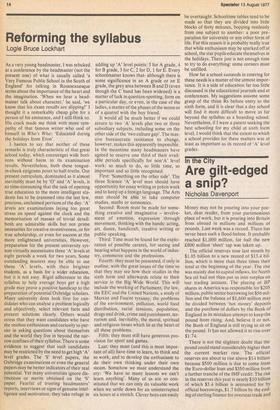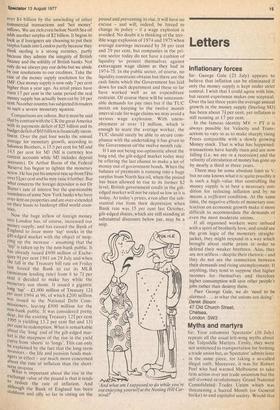In the City
Are gilt-edged a snip?
Nicholas Davenport
Money may not be pouring into your pocket, dear reader, from your parsimonious place of work, but it is pouring into Britain from abroad in millions and millions of pounds. Last week was a record. There has never been such a flood before. It probably reached $1,000 million, for half the new £.800 million 'short' tap was taken up.
The official reserves rose last month by $1.85 billion to a new record of $13.4 billion, which is more than three times their total at the beginning of the year. The rise was mainly due to capital inflows, for North Sea oil had not then put us into surplus on 'our trading account. The placing of BP shares in America was responsible for $205 million, public sector borrowing for $56 million and the balance of $1,600 million may be divided between 'hot money' deposits and the purchase of dollars by the Bank of England in its mistaken attempt to keep the pound from rising. And, believe it or not, the Bank of England is still trying to sit on the pound. It has not allowed it to rise over $1.74.
There is not the slightest doubt that the pound could stand considerably higher than the current market rate. The official reserves are about to rise above $14 billion because $500 million is due to come from the Euro-dollar loan and $350 million from a further tranche of the IMF credit, The rise in the reserves this year is nearly $10 billion of which $3.4 billion is accounted for by official borrowings, $1.7 billion by the ending of sterling finance for overseas trade and over $4 billion by the unwinding of' other commercial transactions and 'hot money' inflows. We are rich even before North Sea oil adds another surplus of $2 billion. It begins to look as if foreigners are choosing to put their surplus funds into London partly because they think sterling is a strong currency, partly because they admire the integrity of British finance and the solidity of British banks. Not only do we always pay our debts but we abide by our resolutions to our creditors. Take the case of the money supply resolution for the IMF. Our money supply is now only 7 per cent higher than a year ago. As retail prices have risen 17 per cent in the same period the real money supply has actually been cut by 10 per Cent. No other country has subjected itstraders
to such a severe monetary squeeze.
Comparisons are odious. But it must be said that by contrast with the UK the great America With its payments deficit of $25 billion and its • budget deficit of $65 billion is financially incontinent. Over the past four weeks the annual
average for monetary growth, according to Salomon Brothers, is 15.8 per cent for MI and 14.5 per cent for M3 (MI is currency less current accounts while M3 includes deposit accounts). Dr Arthur Burns of the, Federal Reserve has begun to tighten the monetary screw. He has put his interest rate up from5ito merSipercent and he may raie it further. But What concerns the foreign depositor is not Dr Burns's rate of interest but the questionable soundness of some New York banks who have over-lent on properties and are over-extended on their loans to bankrupt third world countries.
Now the huge inflow of foreign money into London has, of course, increased our money supply, and has caused the Bank of England to issue more 'tap' stocks in the gilt-edged market with the object of mopPing up the increase — assuming that the 'tap' is taken up by the non-bank public. It has already issued £800 million of' Exchequer 9i per cent 1981 on 29 July and when the fall in the Treasury bill rate on Friday last forced the Bank to cut its MLR (minimum lending rate) from 8 to 7i per cent it decided to make hay while the monetary sun shone. It issued a gigantic long 'tap' — £1,000 million of Treasury 12i Per cent 1994 at 96, of which £200 million was issued to the National Debt Commissioners, leaving £800 million for the non-bank public. It was considered pretty dear, for the existing Treasury 12i per cent 1995 is yielding 13.2 per cent flat and 13i Per cent to redemption. What is remarkable about the 'long' end of the gilt-edged market is the steepness of the rise in the yield Fume from 'shorts' to 'longs'. This can only e explained by the fact that the long-term investors,— the life and pension funds managers in effect — are much more concerned about the rate of inflation than the shortterm investor.
What is important about the rise in the exchange value of the pound is that it tends to reduce the rate of inflation. And although the Bank of England has been stubborn and silly So far in sitting on the pound and preventing its rise, it will have no excuse — and will, indeed, be fOrced to change its policy — if a wage explosion is avoided. No doubt it is thinking of the terrible wage explosion of 1974 and 1975 when average earnings increased by 38 per cent and 29 per cent, but companies in the private sector today do not have a cushion of liquidity to protect themselves against extravagant wage claims as they had in 1974-75. In the public sector, of course, no liquidity constraint obtains but there are the cash limits which the Government has laid down for each department and these so far have worked well as an expenditure restraint. Of course there will be unreasonable demands for pay rises but if the TUC insists on keeping to the twelve month interval rule for wage claims we may avoid a serious wage explosion. With unem
ployment at over U million, which is enough to scare the average worker, the TUC should surely be able to secure compliance with the undertaking it has given to the Government °tithe twelve month rule.
If' I am not being too optimistic about the long end, the gilt-edged market today may be offering the last chnnce to make a lot of money out of government bonds. When the balance of payments is running into a huge surplus from North Sea oil, when the pound has been allowed to rise to its former $2 level, British government credit in the giltedged market will not be rated so low as it is today. At today's prices, even after the sub stantial rise from their depression when Bank rate was 15 per cent last October, gilt-edged shares, which are still standing at substantial discounts below par, may be a snip.



































 Previous page
Previous page